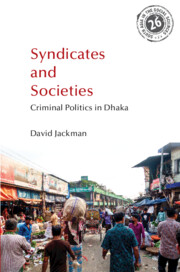2. - The Years of Terror
Published online by Cambridge University Press: 31 August 2024
Summary
In Dhaka people usually wake with the sound of crows. Here we woke with the sound of bomb blasts.
—Former affiliate of ‘Picchi’ Hannan, living in the rail line bastiBefore meeting the jhupri labourers, I had heard of Kawran Bazaar's reputation through old colleagues and friends. On the few occasions I had visited over the years, I had seen that by day it was a chaotic bazaar. By night, I was warned, it was one of the most dangerous places in Dhaka. I was unclear where this reputation came from and had heard only vague descriptions of badmash (criminals), mastan (gangster, thugs) or that ‘there's lots of politics there’. I was thus surprised after getting to know the jhupri labourers to see little sign of violence other than the scuffles between labourers trying to reach trucks, and was told there were plain-clothes police stationed nearby, keeping a watchful eye over the market. I hence began to formulate questions about some of the terms my colleagues had used or that I had seen opaque references to in academic literature. Are there mastan here? What do mastan do? These questions largely fell flat. Some pointed my attention to the young thieves who stole mobile phones from passengers at the nearby Tejgaon railway station, some of whom I knew.
It was when I began to ask what the bazaar used to be like that replies became animated. Over subsequent years of research, labourers and political leaders here have conveyed consistent and evocative descriptions of the 1980s to 2000s: this ‘was a time of chaos’, an ‘underworld’ (aparadh jagat), an era ‘of terror’, a time when ‘the whole bazaar was held hostage by gangsters’ and ‘guns were like toys’. A Jubo League activist well established in the area put it like this:
The situation was terrible. It was even hard to enter Kawran Bazaar. Fear was everywhere, and everyone was scared. Theft and muggings were normal. It got worse after Ershad fell and the BNP came to power. People were murdered in broad daylight, traders were stopped by the gangsters [santrashi] and had all their money taken.
- Type
- Chapter
- Information
- Syndicates and SocietiesCriminal Politics in Dhaka, pp. 46 - 72Publisher: Cambridge University PressPrint publication year: 2025

